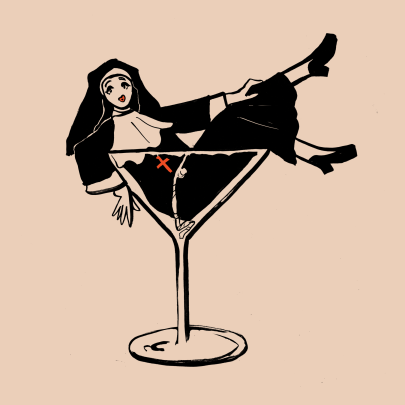Sep 16, 2013 Theatre
Q Theatre
September 14, 2013
Monkeys appear in the back of the auditorium, watching us, reaching up tentatively to the balcony, loping down towards the stage. In those monkeys, in those first moments, you get everything that’s wonderful about this show, and also one of the things that’s disappointing.
What’s wonderful? The beautiful, expressive craftwork in the masks, made by Wayan Tanguuh. The languid, precise movement of bodies behind the masks. The ability of those things, and the lovely music of David Ward, to transform us to another place and another way of thinking, and to open our minds and hearts to the marvel of a story well told. The monkeys take the stage, they join the musician, there’s a song, and away we go.
It’s utterly charming, and as this long show continues there will be many more moments to reinforce that charm.
Indian Ink’s new play Kiss the Fish is set on a generic island somewhere in Asia. A family battles poverty, emotional feuds and the enticements of modernity (a tourist resort wants to buy the spring that waters their rice paddy), all the while trying to establish some sense of dignity and personal pride.
On their first night in Auckland there was hesitation in some of the performances – slow cues, overly quiet responses, moments of empty physicality. On the whole, though, especially in the second half, they kept us engrossed. Four actors, 11 characters in masks (plus monkeys and a star turn by Julia Croft as Freddie Mercury – yes, truly), a few songs, some hanging cloths: it’s so delightful to watch a story created from so little, with such dedication to craft skills. The mask work of this troupe alone is breathtakingly good.
One of the added delights, metaphorically inherent in those monkeys appearing in a Kiwi theatre, is that this is so comfortably presented as a story we can tell. The cast – Croft, James Roque, Nisha Madhan and the incomparable Jacob Rajan – represent a little slice of modern New Zealand: rooted in Asia and in this country, drawing with respect from whatever cultural traditions are valuable to them, telling a story about the world in which we live, and about our connection to that world, and also about us.
And the disappointments signalled by those monkeys? It’s a still, calm work, celebrating small lives, which is to be treasured. Physically, though, one starts to long for action that is bigger, faster, scarier, more breathtaking. None of the actors ever rushes from one character to the next, upsets anything, sets the story alight. Put it this way: none of the monkeys swings from anything. Nothing is put physically at risk.
Indian Ink have been at it so long now, it’s clear they don’t want to go down that path. I think it’s a pity. If the exquisite moments were matched by some dynamic action, this show could be really riveting.
That same reluctance to get dynamic is apparent in a failure to explore the themes. Near the end, it’s suggested that the island is like a boat: if everyone sits down and stays in their place, they will stay afloat. It sounds, for a nanosecond, like wisdom – until you remember that this is the sentiment used throughout history by every tyrant, every oppressive religion, every reactionary caste system to hold on to power. It’s the very thing that made the characters of this play so poor to start with.
The programme notes make it clear that Indian Ink believe they are challenging the wrongs of the world, not complacently reinforcing them. But it’s hard to find that in the work.
The themes of the play miss the mark on another level too. The moral dilemma at the heart of Kiss the Fish is whether it is right to risk giving up your traditions, your links to the land, your very sense of self, if it means you can break free of poverty.
It’s a big and important question, but they resolve it by an accident of fate – the developer goes bankrupt – which is no help with the moral dilemma itself.
This isn’t relevant only in the developing world. This show charts an exact parallel with one of the biggest questions we face in New Zealand right now: whether to transform our economy by full-scale exploitation of our mineral resources. If we take the money, what will we have to give up? It’s a serious question, and sadly Kiss the Fish provides little help in understanding it.
A beautiful show. But a thin one.
Until October 5.
Photographed by Stephen Langdon.





